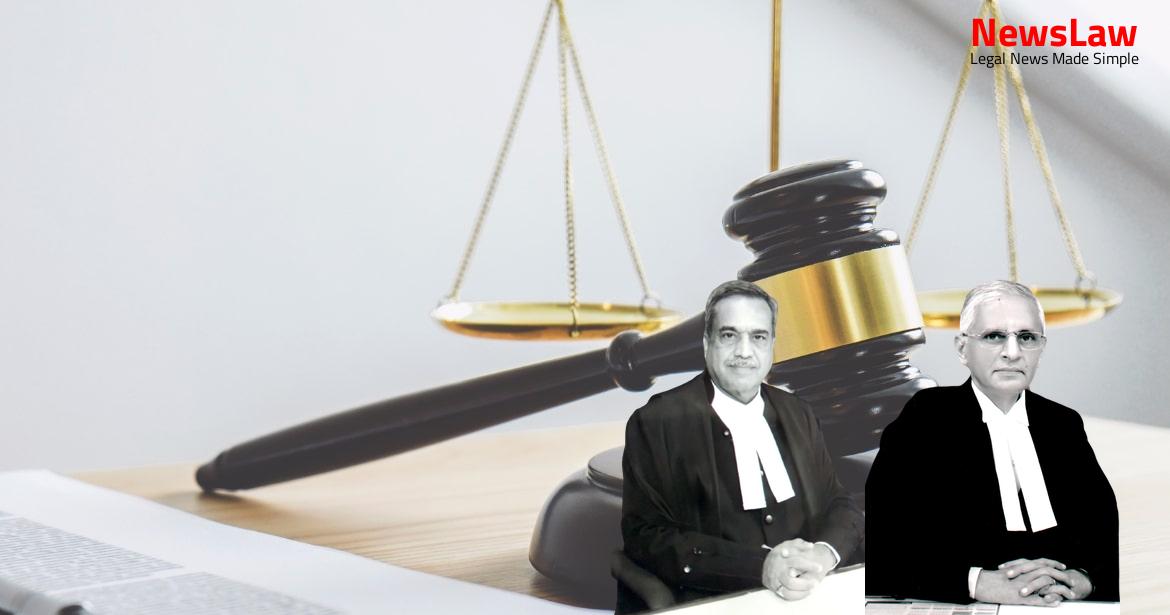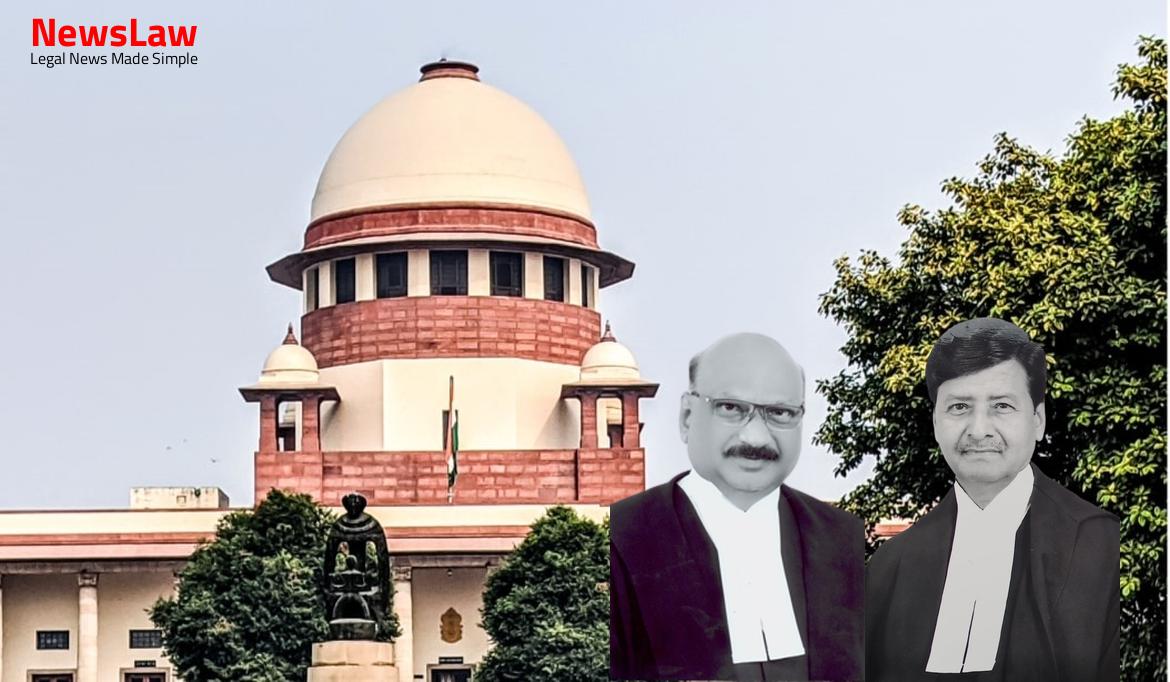Delve into the legal intricacies of a recent case concerning land acquisition and compensation determination. The court’s analysis focuses on whether a particular party should be considered a ‘person interested’ in the proceedings under the KIAD Act, 1966. This case summary underscores the importance of legal clarity and precedent in such matters. Stay informed about the latest developments in land acquisition law and compensation determination.
Facts
- The High Court of Karnataka at Bengaluru set aside the judgment and order passed by the Reference Court in First Appeal No 259 of 2021 and other allied first appeals.
- The matter has been remanded to the Reference Court for a fresh decision after allowing all parties, including M/s. Mangalore Refineries & Petrochemicals Ltd. (MRPL), to adduce evidence.
- The aggrieved original claimants/landowners have filed appeals against the High Court’s decision.
- The Land Acquisition Officer passed an award on 06.10.2009 after hearing the owners of the land.
- The lands of the original claimants were acquired under Section 28(4) of the Karnataka Industrial Areas Development Act, 1966.
- References were made to the Reference Court at the instance of the landowners.
- MRPL, the lessee allotted the land by KIADB, appealed the judgment and award of the Reference Court dated 29.07.2020 before the High Court.
- MRPL argued that as the beneficiary of the acquisition, it must pay the additional compensation according to the agreement with KIADB.
- The Reference Court on 29.07.2020 increased the amount of compensation.
- MRPL was not heard by the Reference Court despite its obligation to pay the additional compensation.
Also Read: Challenging Legal Presumptions in Negotiable Instrument Cases
Arguments
- The petitioner has argued that the MRPL should not be considered a ‘person interested’ in the land acquisition proceedings.
- They have emphasized that the acquisition was carried out by the State Government for the purposes of development through KIADB, not specifically for MRPL.
- The petitioner contends that the High Court erred in allowing MRPL to file appeals and be involved in the compensation enhancement process, citing the case of Peerappa Hanmantha Harijan to support their position.
- They assert that under the KIAD Act, the beneficiary of the acquired land is KIADB, not the MRPL.
- The petitioner claims that the MRPL cannot be held liable for compensation without having the opportunity to contest the enhancement before the Reference Court.
- They argue that the High Court misinterpreted the precedence set by the Peerappa Hanmantha Harijan case and failed to follow it.
- Various decisions of the Supreme Court have been cited by the petitioner’s counsel to support their argument against MRPL’s involvement in the compensation determination.
- On the other hand, the original landowners argue that MRPL, as the allottee from KIADB, is the beneficiary of the land acquisition proceedings and not KIADB.
- They point out that the amount awarded by the Land Acquisition Officer was deposited by KIADB, not MRPL.
- The disagreement revolves around whether MRPL should be considered a ‘person interested’ and a proper party in the compensation determination proceedings.
- Learned counsel for MRPL argues that MRPL should not bear the burden of enhanced compensation without a fair chance to contest it.
- Refers to the case of UP Awas Evam Vikas Parishad and highlights paras 22 and 41.
- Argues that the ratio of the UP Awas Evam Vikas Parishad case has not been considered in the Peerappa Hanmantha Harijan case.
- Emphasizes on principles of natural justice and legitimate expectation to ensure MRPL is not left remediless with financial implications.
- Prays for dismissal of the appeals based on the above arguments.
- Court is tasked with determining whether MRPL, as an allottee of land post-acquisition, is a ‘person interested’ under KIAD Act, 1966.
- Land acquired under KIAD Act, 1966 for KIADB, with MRPL later being allotted the acquired lands.
- Three different notifications issued for land acquisition by State Government for KIADB.
- MRPL allotted lands as per agreements between KIADB and MRPL.
Also Read: Legal Analysis of Admission Irregularities in Educational Institutions
Analysis
- The acquisition of land was done under the KIAD Act, 1966, not the Land Acquisition Act, 1894, so specific provisions of the latter act do not apply.
- In the case of Peerappa Hanmantha Harijan (2015) 10 SCC 469, it was established that an allottee company under KIAD Act is not considered a ‘person interested’ entitled to a hearing before the determination of compensation.
- High Court’s failure to follow the binding decision of the Supreme Court regarding this matter is against Article 141 of the Constitution of India.
- The lease agreement between the KIADB and the company shows that the company is only a lessee and not a beneficiary of the land, as it was allotted by KIADB for industrial development.
- The original acquisition record and subsequent proceedings confirmed that the allottee company cannot be considered a beneficiary or a party interested in the land acquisition process.
- The High Court committed a grave error in passing the judgment by relying on previous judgments and not following a subsequent decision of the Court.
- The land acquisition was for industrial development by KIADB, and the Company was not the beneficiary of the acquired land.
- The Company, as the lessee, is not considered the beneficiary or an interested person in the acquisition.
- The Company does not have the right to file an appeal or a writ petition regarding the acquired land.
- The judgments relied upon by the Company and KIADB are not applicable to the case.
- The acquisition of land by KIADB was clear from notifications and procedures followed.
- The High Court’s order to include the Company in the redetermination of compensation was impermissible.
- The Company is not a beneficiary of the acquired land, and the High Court rightfully dismissed the belated appeal by KIADB.
- The writ petition filed by the Company questioning the award’s correctness is not maintainable in law.
- The Company’s claim to participate in the compensation determination process is untenable and rejected.
- MRPL is a subsequent allottee after the land was acquired by KIADB.
- MRPL cannot be considered a beneficiary or a ‘person interested’ for determining compensation.
- The High Court’s judgment, which took a contrary view, is unsustainable and should be quashed.
Also Read: Legal Analysis: Driver Appointment Dispute
Decision
- The judgment and order passed by the Reference Court is hereby restored.
- No order as to costs in the facts and circumstances of the case.
- Present appeals are allowed.
- The impugned common judgment and order passed by the High Court is quashed and set aside.
- Notice to be issued to the State Government.
- The present appeals succeed.
Case Title: GREGORY PATRAO Vs. MANGALORE REFINERY AND PETROCHEMICALS LIMITED (2022 INSC 693)
Case Number: C.A. No.-004105-004107 / 2022



